SEM and LM insights: Spore morphology and its taxonomic significance in Sino Himalayan, Malesian, and European elements of Pteridaceae
Abstract
The Pteridaceae family, known for its taxonomic complexity, presents challenges in identification due to high variability among its species. This study investigates the spore morphology employing both SEM and LM techniques in 10 Pteridaceae taxa phytogeographicaly Sino-Himalayan, Malesian, and European elements in Pakistan. The taxa include Adiantum capillus-veneris, A. incisum, A. venustum, Aleuritopteris bicolor, Oeosporangium nitidulum, O. pteridioides, Onychium cryptogrammoides, O. vermae, Pteris cretica, and P. vittata. The objective is to assess their taxonomic relevance and develop a spore-based taxonomic key. Findings indicate differences in spore shape, sizes, exospore thickness, and in surface ornamentation highlighting the potential for taxonomic differentiation. Spores are trilete, and notable differences are observed in the dimension of spores in both distal and proximal sides. Equatorial dimensions vary between 35 and 50 μm, while the polar diameter ranges from 29 to 50 μm. SEM revealed different spore ornamentation types that show several useful characteristics establishing valuable taxonomic variations. The studied Adiantum taxa feature a perispore with tubercules and a micro-granulose surface. The spores of examined Oeosporangium and Aleuritopteris taxa shows cristate sculptures with variable ornamentations. Both species of Onychium have tuberculate-pleated tubercles with sinuous folds on both distal and proximal sides. The surface ornamentation among examined Pteris taxa show variability. PCA analysis indicated that spore quantitative data identified distinct groups, underscoring taxonomic significance. Nevertheless, there was variation observed in surface ornamentation and spore shape, indicating the potential for discrimination among taxa.
Research Highlights
- Spore morphology of 10 Pteridaceae taxa has been investigated through LM and SEM.
- Investigated species shows differences in spore shape, sizes, exospore thickness, and in surface ornamentation.
- Ornamentation on the perispore provides several valuable characteristics, establishing useful taxonomic distinctions.
- Spore morphological analysis is effective at the generic level, with minor distinctions discernible at the species level.


 求助内容:
求助内容: 应助结果提醒方式:
应助结果提醒方式:


